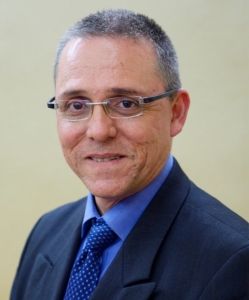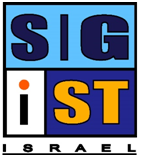Alon Linetzki ● alonl@sigist.org.il
 Alon Linetzki may not be very well known in the Dutch testing community. But this is about to change: Alon will be the opening keynote speaker at the TestNet autumn event on October 30th, where he will present on the importance of testing in Agile and the ISTQB® Agile Extension. We are pleased with the opportunity to ask some questions to Alon as an appetizer for his presentation.
Alon Linetzki may not be very well known in the Dutch testing community. But this is about to change: Alon will be the opening keynote speaker at the TestNet autumn event on October 30th, where he will present on the importance of testing in Agile and the ISTQB® Agile Extension. We are pleased with the opportunity to ask some questions to Alon as an appetizer for his presentation.
You have a prominent role within ISTQB®. How did you get involved and why, in your opinion, is ISTQB® important for the testing community?
I was involved with the SIGiST in Israel and established it in 2000. Until that time, we (a few experts of testing in Europe) used to meet in every EuroSTAR, to discuss mutual activities in testing, and exchange ideas. It did not grow into a world SIGiST, but it did, I believe, contribute to the establishment of ISTQB®.
I have co-founded ISTQB® in Israel in 2004, about 2 years after it was established internationally. We have established it in Israel with the goal of raising the awareness to testing and QC as a profession. We had big dreams and big ideas, which are now starting to get real, and we thank all the members in all countries for their contribution and efforts for making this dream a reality.
 I think you have phrased your question perfectly: ISTQB® is a highly important organization and mainly for the testing community. Ten years ago the image of a tester was very low, and many thought that testers can be ‘guys you pick up on campus’, give them a manual to read on how to run the system, and this is it. Today – and as I am exposed to many activities ISTQB® is doing worldwide – I am able to say it comes with a lot of efforts done by ISTQB®. ISTQB® presence today is at about 70 countries, and is covering all of the major IT world centers. Most countries developing software are represented at the ISTQB® General Assembly table and are involved in making decisions to take this profession forward worldwide.
I think you have phrased your question perfectly: ISTQB® is a highly important organization and mainly for the testing community. Ten years ago the image of a tester was very low, and many thought that testers can be ‘guys you pick up on campus’, give them a manual to read on how to run the system, and this is it. Today – and as I am exposed to many activities ISTQB® is doing worldwide – I am able to say it comes with a lot of efforts done by ISTQB®. ISTQB® presence today is at about 70 countries, and is covering all of the major IT world centers. Most countries developing software are represented at the ISTQB® General Assembly table and are involved in making decisions to take this profession forward worldwide.
The initiatives ISTQB® has taken in Academia, Government, Military, free testers community and more areas of interest around the world, are starting to pay back. More countries start their own testing community using the ISTQB® General Assembly worldwide meeting (rotating a country every three to four months), and continue to grow themselves. ISTQB® members with positions on the organization (myself included) are traveling to speak around the world to spread the word, and increase the awareness and professionalism, sometimes with minimal pay asked, if at all.
ISTQB® certification population grows ~40K a year, with steady growth over the last decade. New programs like the ISTQB® CTFL-ATE (Agile Tester Extension), and others show we are adaptive to market needs. The latest worldwide survey is showing great results on the testing community satisfaction from the ISTQB® scheme and its findings are showing great need for more certifications in dedicated topics like performance, security, cloud, big-data and more.
As I see this – If due to ISTQB®’s certifications, marketing and events, people want to learn to become better in their profession, if people are more open to new technological changes and new ideas especially in ISTQB® scheme supporting companies – I would say that is a good sign that ISTQB® is a major shaper in the worldwide testing community.
Nowadays, we see a growing opposition against certification in testing. Hundreds of testers explicitly declare choosing not to be certified (see www.professionaltestersmanifesto.org). What is your answer to this movement?
It is first a matter of proportion – a few hundred voices (even if shouted loudly over the media) are not to be compared to hundreds of thousands of test engineers around the world certified already (more than 340,000), with hundreds of thousands more in potential that are on the way to get certified.
I believe this kind of opposition was here in the past and will be here in the future. People don’t like to change or they have a say about how they would like this change to come. Either way – change is coming. We need to be open to absorb it. Certification was, is (in many professions) and will be a way people chose to evaluate knowledge and skills.
From my experience it was never about ‘IF’ to have a certification. It was about ‘HOW’ to pass the knowledge, and ‘WHICH WAY’ should be used to evaluate skills and knowledge.
Practical methods, hands-on exercises, simulations of real life scenarios, and real tester skills should be taught to achieve a certification. The certification bodies that exist today, are trying to adopt and to change in that direction. Discussions are done to evolve and adopt better ways of evaluating knowledge and skills. As in any international standard, change is coming slow in those areas, and so is the realization of change, and the way to coach and evaluate skills and knowledge.
Even standards themselves are in the line of fire, as we see from the STOP ISO29119 petition (see www.ipetitions.com/petition/stop29119). What is your opinion on ISO29119 and how should ISTQB® react to this new standard, which replaces the IEEE and BS standards that ISTQB® used to refer to?
Standards are made by interested parties in having a standard, thus raise fire. Especially if a lot of other standards (a lot of other interested parties…) similar to those developed are in the market already, as with the case of ISO 29119.
I can tell you my own opinion regarding this standard, which is not to be claimed as an official ISTQB® statement, but rather as a personal point of view: ISTQB® has not the goal of defining any new testing standard or to advocate a specific methodology as being a ‘best practice’ or even a ‘good practice’’. We are rather working on packing the existing know-how on testing and making it available to the community in a way that allows to define learning objectives that are related to the business and to perform exams on that. So, in our syllabi we reference many standards and multiple information sources. In this respect, if and when ISO 29119 will be available, we may include references to it as well.
We will probably observe the implementation and adoption of the standard in the market, and discuss if to reference it or not. A standard is not made a standard only because people wrote it, it becomes a standard if – and only after – many companies have used it and found it to be useful.
Agile becomes increasingly more important for testers. You participated as an author in the development of the new ISTQB® Foundation Agile Tester Extension. What are the key benefits of this Foundation extension for agile testers? Should there also be an advanced level agile syllabus in the future?
First, it was an honor to be a part of an excellent team of authors and supporters for the ISTQB® Foundation Agile Tester Extension. I am proud at what we have accomplished in such a short time, working together as a team.
Second, as to the benefits, the knowledge base of the syllabus is comprehensive, and includes all topics that a test engineer needs to know in order to change from a traditional into an agile approach. This time, we emphasized on practical exercises on the critical things that
require skills of analysis, criticality, decision making, etc., and those are required to be included inside the material when any training provider is asking for an accreditation.
So the test engineer, participating on a course (that is accredited), and his manager sending him to that course, both can be sure to get a very good introductory into the world of Agile, based on the business outcomes and learning objectives by which the syllabus was defined.
Again, this is a foundation level certification/syllabus, thus expectations should be on that level for the knowledge/skills obtained. It also means, that a senior agile tester – who has practiced agile for some time – may want to get an advanced level created. We are still investigating that and another interesting topic ‘test leadership & management in agile’, which we believe interest the testing community a lot.

You are the founder and chair of SIGiST Israel, a professional tester’s organization which is quite similar to TestNet. Could more international cooperation between these kinds of organizations be beneficial to the testing profession?
I really like this question! Yes, indeed, we are similar organizations, and I have discussed a few times in the past (unofficially) cooperation with TestNet members.
I believe both NL and ISR testing communities may benefit from this kind of cooperation, sharing ideas to finding solutions to challenges coming our way or sharing failed implementations – which sometimes worth more to us all.
We have our 2014 annual conference coming soon on November 17-20 this year, and most presentation are in Hebrew, but cooperation may result a track in English, and an invitation for TestNet members to join and speak next year. We may mutually grant the Best Presentation award, a speaking slot at main TestNet and SIGiST-Israel event. We can cooperate in publishing articles of both our members contributing to both our testing communities.
I urge anyone who thinks of a good idea for cooperation, to send it over to me at alonl@sigist.org.il.

NieuwsMagazine